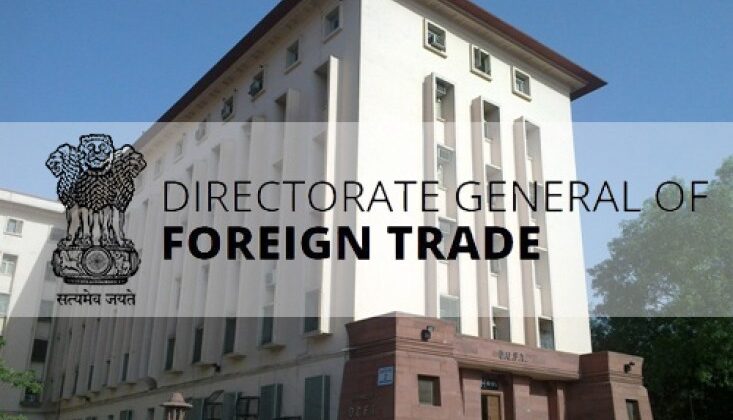
DGFT grants exemptions on the import of the quality control orders
NEW DELHI : The Directorate General of Foreign Trade (DGFT) has granted an exemption to the import of certain goods, including viscose staple fibre and numerous steel items, from quality control orders (QCOs) under the advance authorisation scheme, which allows the duty free import of input goods that are physically incorporated in an export product. In other words, exemption from specified QCOs on the import of input goods has been granted only for use of those goods in exports and not in products manufactured for the domestic market. According to a notification issued last week, the exemption was first granted from QCOs published by the Ministry of Steel and the Department for Promotion of Industry and Internal Trade (DPIIT). DGFT expanded the list to include QCOs published by the Ministry of Textiles.
The notification came almost two months after the Ministry of Commerce and Industry decided against a blanket exemption from QCOs for import of input goods under advance authorization in a meeting with industry representatives on January 10, as per documents accessed through the RTI. The meeting was held to address issues faced by exporters regarding the availability of input goods subject to QCOs and “the requirement of foreign buyers who do not want Indian QCO products,” reveal file notings obtained through the RTI.
During the meeting, DGFT, which is under the commerce ministry, also shared a draft amendment notification addressing the concerns of industry representatives, including those from export promotion councils. However, the ministry concluded that a “blanket exemption for imports against advance authorization from QCOs may not be appropriate”. Instead, he noted that “sector wise analysis of exports and share of exports made under advance authorization needs to be done before granting such exemptions,” and that line ministries examine “issues highlighted by user industry and try to resolve them w.r.t. availability of inputs for the industry”. The ministry also directed DGFT to make small sectoral committees to give recommendations in the matter, documents show.
In a first such instance since the January 10 meeting, the recent notification exempts the import of input goods from QCOs, specifically those published by the steel ministry, DPITT, and the textiles ministry, only if imported under the advance authorisation scheme. In other words, the exemption is granted on a pre-import condition, which requires the imported input goods to be used only for the manufacturing of products that are exported. Additionally, exemption is also granted to export oriented units (EOUs) and units in Special Economic Zones (SEZ) under the same pre-import condition.
The exemption is set to provide relief to exporters who were earlier facing issues with the availability of inputs from specific suppliers. “In many of the export shipments, the buyers also prescribe from where you have to import the material. For example, if you want to export a shirt, the buyer will sometimes tell you to source the fabric from a specific supplier . In that case, the exporter hardly has a choice. From the perspective of the supplier, if they are not regularly supplying to India on a large scale, they are not interested in going through the QCO process because it can take time. As a result, exporters were losing orders as they were not able to import materials from specific suppliers,” explained Ajay Sahai, Director General of the Federation of Indian Export Organisations (FIEO).
Exemption to QCOs is done in consultation with the concerned line Ministry & Bureau of Indian Standards (BIS) with clear safeguards like mandatory pre-import condition, non-diversion to domestic tariff area (DTA), heavy penalties in case of default etc.,” DGFT said in response to an email query sent by The Indian Express. “Any future coverage will depend on industry requirements and line Ministry views,” it added.
Earlier this month, The Indian Express had reported on concerns raised by small- and medium-sized mills regarding lack of availability and uncompetitive pricing in the domestic viscose staple fibre (VSF) market as a result of the VSF QCO, which was published by the textiles ministry and implemented from March, 2023 onwards. Between April and December, 2023, India’s VSF imports fell by 65 per cent to Rs 582 crore compared to the previous year. VSF is a manmade cellulosic fibre widely used in the textile industry as an alternative to cotton. The textiles ministry has also published other QCOs, which cover various goods under the technical textiles segment.
The South India Mills’ Association (SIMA), which is among various industry associations that have been advocating for QCO exemption under the advance authorisation scheme, said that the recent notification will help in boosting textile exports. “I thank the textiles ministry for considering the industry plea and permitting the import of BIS QCO mandated Viscose Staple Fibre under the Advance Authorization Scheme, in addition to allowing the imports by EOU/SEZ units, so as to enable them to meet the requirements of overseas buyers,” SK Sundararaman, Chairman of SIMA, said in a press release.
“A similar notification for Polyester Fibre and its raw material products, for which QCO has been issued by Ministry of Chemicals and Fertilizer, is essential to enable the growth of the synthetic fibre sector, as the polyester is the future growth engine for the Indian textiles and clothing industry,” Sundararaman added.
The DPITT has published multiple QCOs since 2020, covering products like safety glass, retro reflective devices, flat transparent sheet glass, footwear made from leather, rubber, and other materials, sewing machines, and specialised iron pipes. The steel ministry published a QCO on February 5 that covers 145 steel items of various kinds and technical specifications. The rationale behind QCOs is to regulate the import of inferior quality goods from all countries, but specifically from China and ASEAN countries, by mandating overseas manufacturing units to obtain a licence from BIS to export goods covered by QCOs into India.
The obligation under the advance authorisation scheme to export input goods incorporated in manufactured products is within 18 months from the date of issue of the authorisation, as per the Foreign Trade Policy’s Handbook of Procedures. According to the recent notification, input goods that stand unutilised beyond 18 months are required to be destroyed by GST or customs authorities. Moreover, the advance authorisation holder is also required to pay “duties/taxes/cesses exempted along with interest on the unutilised exempted material plus composition fee of an amount equivalent to 10 per cent of the cost, insurance, and freight (CIF) value of unutilized imported inputs to DGFT”.

